|
|
|
Sort Order |
|
|
|
Items / Page
|
|
|
|
|
|
|
| Srl | Item |
| 1 |
ID:
130865
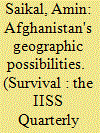

|
|
|
|
|
| Publication |
2014.
|
| Summary/Abstract |
Afghanistan's geostrategic potential is hampered by domestic weakness, regional tensions and major-power competition. Historically, Afghanistan's position at the junction between Asia and Europe has not only made it susceptible to outside invasions and influence, but also rendered it an important conduit for cross-continental interactions. The Greco-Bactrian (250-150 BCE), Kushan (30-375 AD) and Sassanid (224-651 AD) empires derived much of their wealth from the Silk Road, a series of interlinked trading networks criss-crossing the Eurasian land mass and centred around what is now known as Afghanistan. These routes served as the main arteries of east-west trade and transportation, until the disintegration of the Mongol Empire in 1368 AD effectively dismantled the network.
|
|
|
|
|
|
|
|
|
|
|
|
|
|
|
|
| 2 |
ID:
131852
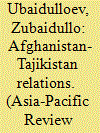

|
|
|
|
|
| Publication |
2014.
|
| Summary/Abstract |
This article attempts to touch upon the relations between Afghanistan and Tajikistan, two neighboring countries, from the historical perspective and the current period. The article analyses the history of Afghanistan-Tajikistan relations during and after the Soviet era, especially during the Afghan Mujahideen's struggle against the Soviet occupational army and Taliban regime in Afghanistan, the Tajikistan civil war of 1992-1997, and after September 11, 2001. In addition, the issues of the ethnic Tajiks in Afghanistan, the violent and vulnerable Tajik-Afghan border, the withdrawal of NATO troops from Afghanistan in 2014 and its impact on Afghanistan-Tajikistan relations, and the new phase of economic relations and an effective cooperation between the both countries are discussed. The article tries to fill the gaps within the body of existing literature and understanding concerning the topic.
|
|
|
|
|
|
|
|
|
|
|
|
|
|
|
|
| 3 |
ID:
138698
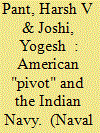

|
|
|
|
|
| Summary/Abstract |
Just after addressing the Shangri-La Dialogue in Singapore in June 2012, Leon Panetta, then the American secretary of defense, visited New Delhi, where he remarked that “defense cooperation with India is a lynchpin in this [pivot] strategy.” Since the thrust of the “pivot” has been on the maritime balance of power in the Indo-Pacific, both the Pacific and the Indian
Oceans have gained tremendous traction in the new U.S. strategy
|
|
|
|
|
|
|
|
|
|
|
|
|
|
|
|
| 4 |
ID:
130871
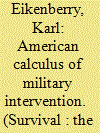

|
|
|
|
|
| Publication |
2014.
|
| Summary/Abstract |
The protracted campaigns in Afghanistan and Iraq have diminished America's appetite for waging wars to end tyranny or internal disorder in foreign lands. Military interventions have traditionally been a source of controversy in the United States. But America's appetite for the dispatch of armed forces has been diminished greatly by factors that have primarily emerged in the twenty-first century. These include, most painfully, the protracted campaigns in Afghanistan and Iraq that have made US political and military leaders more cautious about waging wars to end tyranny or internal disorder in foreign lands.
|
|
|
|
|
|
|
|
|
|
|
|
|
|
|
|
| 5 |
ID:
131029
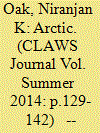

|
|
|
|
|
| Publication |
2014.
|
| Summary/Abstract |
Regionalism as a political project has been a signi?cant phenomenon in post-1945 international relations. The third phase of regional integration began towards the end of the 19805 within the international context created by the end of the Cold War. Academics dubbed it as "new regionalism".' Most of the regional organisations that came up in those days were based on economic cooperation among the states. It was an era of globalisation. The Arctic Council (AC) which emerged in 1996 was a unique case. The 'Arctic' has emerged as a region in international cooperation during the past 20-30 years, as manifest in the creation of the AC. The objective of the AC was sustainable development and environmental protection only, and that is why it may be termed as a unique case in that period.
|
|
|
|
|
|
|
|
|
|
|
|
|
|
|
|
| 6 |
ID:
132308
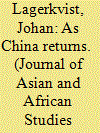

|
|
|
|
|
| Publication |
2014.
|
| Summary/Abstract |
This article investigates how perceptions of China in Mozambican civil society are affected by entrepreneurial activity and bilateral cooperation between China and Mozambique - real, imagined, visible and legal as well as clandestine and illegal in the agricultural and forestry sectors. The research problem concerns how discourse on Chinese investors is formed in Mozambique. Two questions are posed. How does Mozambican civil society perceive their room to maneuver at a time of Chinese growing economic interest and 'return' to Africa? What views exist on the policy space for the national government? Using qualitative ethnographic interviews to answer these overarching questions about expanding/contracting maneuvering space, this article explains how Mozambique's largest social group - peasants - the National Association of Small Farmers (UNAC) and other societal actors perceive Chinese investors. Informed by theoretical debates on civil society, the article argues that coinciding with China's large-scale return to Africa, an already tense dynamic between civil society and the state is picking up speed. It is argued that this phenomenon is likely to have more to do with African governments accruing more power and policy space than through direct impact of Chinese economic activity on African social life. However, to avoid negative discourse formation, China and host governments need to become more open on and transparent about bilateral agreements.
|
|
|
|
|
|
|
|
|
|
|
|
|
|
|
|
| 7 |
ID:
130648


|
|
|
|
|
| Publication |
2013.
|
| Summary/Abstract |
The committee's report has highlighted the diversity of the countries of the Indian Ocean Rim and the multiple ways it which these states can be categorised. This diversity and the lack of a single agreed definition of the 'Indian Ocean Rim' has created a significant challenge for the development of policy, from both an Australian and a regional perspective. Australia's approach to trade in the Indian Ocean Rim is largely bilateral; defence and strategic relations are based on single issue groupings; and aid to the region is predominately provided under the auspices of the United Nations. Evidence gathered in relation to the Indian Ocean Rim Association for Regional Co-operation (IOR-ARC) demonstrates clearly that diversity in the region - both economic and political - has created inertia in the region's main organisation.
|
|
|
|
|
|
|
|
|
|
|
|
|
|
|
|
| 8 |
ID:
145423


|
|
|
|
|
| Summary/Abstract |
This article argues that geoeconomics, defined as the geostrategic use of economic power, has become an increasingly important feature of regional powers’ strategic behavior. Yet, we still lack analytical tools to identify and compare regional powers’ geoeconomic strategies. The article marks a first attempt to develop a typology for differentiating potential geoeconomic strategies that regional powers may pursue in dealing with their corresponding regions. It merges the regional power focus with a geoeconomic perspective, producing the following four ideal-typical strategies: neo-imperialism, neo-mercantilism, hegemony, and liberal institutionalism.
|
|
|
|
|
|
|
|
|
|
|
|
|
|
|
|
| 9 |
ID:
131031
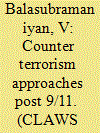

|
|
|
|
|
| Publication |
2014.
|
| Summary/Abstract |
Most studies on terrorism and political violence by experts and researchers have focussed on the causation factors of terrorism over the years. A majority of the scholarly works has mostly focussed on the historical, ideological, and etiological aspects of terrorism and insurgency. Scholars, researchers and investigators have attempted to epitomise and de?ne terrorism as a phenomenon, and have admitted to the problems in ?nding a universally acceptable de?nition. They have primarily focussed on bringing out an acceptable definition of terrorism in all its manifestations and forms, and in the process, have analysed the roots, origins and growth of terrorism. Compared to the enormous literature on the growth and incline of terrorism the world over, studies or scholarly works on the decline of terrorism or insurgency are not as vast and are limited in number.' A few experts like Martha Crenshaw and Audrey Cronin have dealt with this aspect in detail.' However, these attempts comprise only a fragment of the total terrorism literature in place.
|
|
|
|
|
|
|
|
|
|
|
|
|
|
|
|
| 10 |
ID:
130893
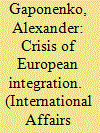

|
|
|
|
|
| Publication |
2014.
|
| Summary/Abstract |
AFTER THE USSR'S COLLAPSE, the Baltic states came under the political influence of the US and the economic influence of the European Union. This influence was used by their new geopolitical "curators" to initiate an anti-Russian line in both the foreign and domestic policies of Latvia, Lithuania and Estonia, as well as to break their economic ties with Russia. At present, the only significant economic ties that Russia still has with the Baltic countries are in the energy sector. It's the supply of natural gas through the pipeline and distribution systems with the use of the Incukalns underground storage facility. It's also the supply of Russian electricity and rail deliveries of hydrocarbons via the Ventspils and Klaipeda ports.
|
|
|
|
|
|
|
|
|
|
|
|
|
|
|
|
| 11 |
ID:
131018
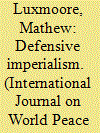

|
|
|
|
|
| Publication |
2014.
|
| Summary/Abstract |
This article examines Russia's approach to the post-Soviet space in relation to domestic stability during
I'utin's first two terms. It identi?es three dimensions of security which underpinned foreign policy during
this period-ideological, economic, and mi1itary~and demonstrates how each interacted with policies on the domestic front. Assessing Rnssia's response to Ukraine's Orange Revolution, it shows how the events of 2004 initiated a shift towards insulation from perceived external threats to political stability. A policy of "defensive imperialism" emerged whereby offensive actions abroad were aimed fundamentally at facilitating a stable external environment to politically safeguard the regime. The article concludes with a brief assessment of developments since 2008, and offers a pessimistic prognosis of the impact this trend will have on Russia's domestic stability and its international relations.
|
|
|
|
|
|
|
|
|
|
|
|
|
|
|
|
| 12 |
ID:
131950


|
|
|
|
|
| Publication |
2014.
|
| Summary/Abstract |
In a novel approach to studying political mobilization among ethnic Tibetans in China, this article addresses two key questions. First, considering the Chinese state's repressive policies towards Tibetan Buddhism, what role does religion play in fomenting Tibetan political resistance? Second, what implications can be drawn from the changing ethnic demography in Tibet about the conflict behaviour of Tibetans? Using various GIS-referenced data, this article specifically examines the 2008 Tibetan protest movements in China. The main results of our analysis indicate that the spread and frequency of protests in ethnic Tibetan areas are significantly associated with the number of officially registered Tibetan Buddhist sites, as well as the historical dominance of particular types of Tibetan religious sects. Furthermore, our analysis shows that the effect of Han Chinese settlement on Tibetan political activism is more controversial than previously though
|
|
|
|
|
|
|
|
|
|
|
|
|
|
|
|
| 13 |
ID:
130942
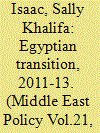

|
|
|
|
|
| Publication |
2014.
|
| Summary/Abstract |
This paper tackles the political and security complications of the Egyptian transition from its inception in January 2011 until the fall of the Muslim Brotherhood president, Mohamed Morsi, in July 2013, with a primary focus on how these complications are of strategic importance to Europe. It starts with inferring Egypt's role in European Union (EU) approaches to security in the Mediterranean, which were acknowledged in the 2003 European Security Strategy and then largely interpreted in the 2004 European Neighborhood Policy. It argues that the old EU democracy-stability dilemma persisted in Europe's approach to the Egyptian transition, especially during Morsi's one-year presidency. In discussing the current political and security complications of the Egyptian transition and how they constitute strategic concerns to Europe, the analysis tackles undermined social cohesion in Egypt due to processes of repolarization in Egyptian society after July 2013; the question of Egypt's porous borders with the Hamas-controlled Gaza Strip; the emergence of the Sinai Peninsula as a jihadist center; and the rising importance of economics in the EU-Egyptian relationship
|
|
|
|
|
|
|
|
|
|
|
|
|
|
|
|
| 14 |
ID:
130998
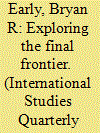

|
|
|
|
|
| Publication |
2014.
|
| Summary/Abstract |
While space capabilities were once concentrated among a handful of leading powers, an increasingly large number of states have gained access to them. As of 2007, 58 countries possessed dedicated civil space programs, 44 countries had placed nationally owned satellites into orbit, and 9 countries had achieved domestic space launch capabilities. To date, however, no systematic inquiries have ever been conducted into which countries acquire space capabilities and why. Within this paper, I develop an explanatory account that explores the capacity-based factors and political motivations that influence countries' acquisition of space capabilities. I test my hypotheses via a quantitative analysis of the factors affecting 143 countries' acquisition of civil space programs, satellite capabilities, and space launch capabilities from 1950 to 2002. My findings shed new light on the primary causes of the proliferation of civil space capabilities and yield a number of important policy implications
|
|
|
|
|
|
|
|
|
|
|
|
|
|
|
|
| 15 |
ID:
137509
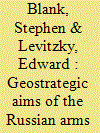

|
|
|
|
|
| Summary/Abstract |
Russia views its military exports as a major tool for achieving its national security interests, particularly, in the East Asia and the Middle East. The arms trade is an integral part of its image as a world power, a critical part of its relationship with other states in Asia, a central element in its defense and security agreements, and an essential component of its ability to obtain and maintain access to influence and resources in regions of interest. So, while it is true that Russia does sell arms and military equipment to generate revenue and extend production runs for its defense industry, it is erroneous to claim that this in the central driver behind Russia’s arms trade. Russia seeks to maintain and expand its status as a world power, and views the focused, purposeful export of its military technologies to key countries as a fundamental tool in achieving this.
|
|
|
|
|
|
|
|
|
|
|
|
|
|
|
|
| 16 |
ID:
020863
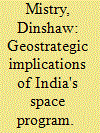

|
|
|
|
|
| Publication |
Nov-Dec 2001.
|
| Description |
1023-1043
|
|
|
|
|
|
|
|
|
|
|
|
|
|
|
|
| 17 |
ID:
130644


|
|
|
|
|
| Publication |
2013.
|
| Summary/Abstract |
With the 'global land grab' now a primary ongoing process in the developing world, greater attention to region-specific analyses provides critical insights for effective policy responses. The Indian Ocean world has the greatest regional concentration of large-scale land acquisitions (LSLAs) globally, and it is also where most of the investor countries reside. Yet examination of Indian Ocean-specific patterns and processes of LSLAs is lacking. One of the most sought after categories of lands are those in forested or recently forested areas, owing to their high potential natural resource and agricultural value. This review article examines the primary issues, actors and impacts of LSLAs of forest-related lands in the broader Indian Ocean world, while assessing the opportunities for national populations of target countries as well as investors and the key social and environmental concerns requiring policy attention.
|
|
|
|
|
|
|
|
|
|
|
|
|
|
|
|
| 18 |
ID:
130643


|
|
|
|
|
| Publication |
2013.
|
| Summary/Abstract |
A rising Africa has caught the attention of the world not merely because of its vast natural resources but also because it is the economically fastest growing continent. The article argues that, as Africa gains prominence, the roles of China and India have come into focus. New Delhi's current policy is quite different from that it pursued in the post-independence era, which was focussed on the limited political agenda of anti-colonialism. Even as its interests in the Indian Ocean rapidly grow, its great power ambitions are increasing backed by a burgeoning economy. This has necessitated a new a new policy of engagement that is expansive and multifaceted, encompassing political, economic and strategic dimensions. India maintains that its robust economic relationship is part of South-South cooperation and hence mutually beneficial, for it is aimed at capability and institution building. While economic and political aspects continue to dominate the academic discourse, the Indian Ocean is beginning to become a significant factor in India's Africa policy, even as this ocean acquires enormous geostrategic and economic
|
|
|
|
|
|
|
|
|
|
|
|
|
|
|
|
| 19 |
ID:
132335
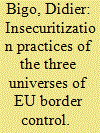

|
|
|
|
|
| Publication |
2014.
|
| Summary/Abstract |
What practices of (in)securitization involve the notions of border and border control in the European Union? How do these practices operate? How are they assembled? In the resulting assemblage, is the notion of borders - understood as state borders - still relevant for the control of individuals and populations moving across the frontiers of the EU? Drawing on empirical observations and with a specific focus on how border control is translated into different social universes, this article seeks to show that practices of control are routinely embedded in a practical sense that informs what controlling borders does and means. This practical sense is itself informed by different professional habitus and work routines involving deterrence and the use of force, interrogation and detention, surveillance of populations on the move and the profiling of (un)trusted travellers. Its strength varies in relation to its shared dimension by most of the operators, and is adjusted to the materiality of borders as well as to the local contexts in which it is deployed. It activates, or does not activate, the maximal use of various control technologies (satellites, pre-registration and interoperable exchange of data between the state and private bureaucracies, biometrics identifiers, body-scanners). For understanding practices of (in)securitization, actual work routines and the specific professional 'dispositions' are therefore more important than any discourses actors may use to justify their activities.
|
|
|
|
|
|
|
|
|
|
|
|
|
|
|
|
| 20 |
ID:
132003
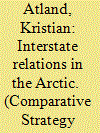

|
|
|
|
|
| Publication |
2014.
|
| Summary/Abstract |
The five states that surround the Arctic Ocean- Russia, Canada, the United States, Denmark, and Norway-have in recent years taken various measures to protect their economic and security interests in the north. The measures include not only the adoption of Arctic strategies, but also the development of new military capabilities. As in other parts of the world, one state's military efforts to enhance its security may have the unfortunate effect of making others feel less secure, and therefore more likely to undertake similar efforts. Thus, despite being a low-tension region, the Arctic is by no means immune to the logic of the security dilemma.
|
|
|
|
|
|
|
|
|
|
|
|
|
|
|
|
|
|
|
|
|